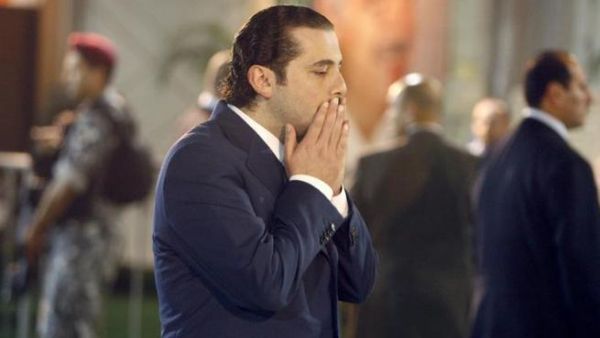Former Prime Minister Saad Hariri proposed Friday the formation of a government excluding his Future Movement and Hezbollah as a means to break the Cabinet deadlock, saying his group was ready to attend National Dialogue to discuss the divisive issue of the party’s arms.
In a televised speech from his residence in the Saudi city of Jeddah addressing several Ramadan iftars organized by the Future Movement in Beirut, the north and south, Hariri lashed out at Hezbollah, blaming the party’s use of its arms to influence political life in Lebanon and its sending fighters to Syria for the long-simmering sectarian tensions in the country.
He denounced the rocket attack near Baabda Palace Thursday evening as a “terrorist message” aimed at undermining the symbols of the state.
“There are people working to drag Lebanon into the eye of the storm, and the missiles that targeted the vicinity of the Presidential Palace and the Defense Ministry are a terrorist message aimed at undermining the symbols of the state and toppling the Baabda Declaration,” Hariri said.
Commenting on Speaker Nabih Berri’s call for him to return to Lebanon and head the Cabinet, Hariri urged Hezbollah and its March 8 allies to help Prime Minister-designate Tammam Salam form a government. He urged Hezbollah to sacrifice for Lebanon by agreeing to stay out of the new Cabinet.
“We are ready then to make a sacrifice and ... not participate in the government,” Hariri said. “Why don’t you make a sacrifice, only once, especially that you are coming out of two years of a government that you formed alone, and everyone, from all communities and regions and views, saw the result of the government you formed alone.”
Hariri reaffirmed commitment to dialogue as an indispensable means to defuse sectarian tensions.
“We did not give up on dialogue as a national necessity, and on our belief that policies to cancel others in Lebanon are useless,” he said. “Everyone knows that the fundamental problem is the arms. And everyone knows that this problem cannot be solved at the Cabinet table.”
“Hezbollah said it is ready for dialogue, and we tell the president: We’re ready for dialogue, at any time he calls for it,” he added.
Hariri praised Sleiman’s Army Day speech in which he said the resistance’s arms have gone beyond Lebanon’s border, and that the Army’s tasks are impossible to fulfill if the duality of legal and illegal weapons continues.
Hariri said he would be in contact with his March 14 allies, at the forefront of those seeking a historic agreement that restores consideration to the state and confirms its monopoly of possessing and using weapons.
He reaffirmed support for the Army’s role in defending Lebanon and maintaining national unity. “The Army’s weapons are above all weapons in the face of any illegal weapons,” he said.
Hezbollah leader Sayyed Hasan Nasrallah made a rare public appearance in Beriut’s southern suburbs to mark Al-Quds Day. He did not comment on the rocket attack near Baabda or Sleiman’s Army Day speech.
The rocket attack has jolted the already tense political landscape in Lebanon, drawing warnings of attempts to destabilize the country.
Adding to the confusion is the fact that the rocket attack happened several hours after Sleiman delivered a speech on Army Day in which he sharply criticized Hezbollah’s military intervention in Syria and called for a national defense strategy to control the party’s arsenal.
The Army scanned areas on the outskirts of the towns of Aramoun and Bshamoun in Mount Lebanon in search for a launch site after two 107mm Katyusha rockets fired overnight landed within the security perimeter of Baabda Palace, security sources said. No casualties were reported from the attack at 11:35 p.m Thursday.
Caretaker Interior Minister Marwan Charbel said Friday it was not clear who fired the rockets because such projectiles are available to several groups.
“The rockets fired yesterday toward Baabda and Yarze are the same rockets fired from Ballouneh toward Jamhour and on the southern suburbs,” Charbel told the Voice of Lebanon radio.
Sleiman was defiant after the rocket attack allegedly targeting him, saying the incident would not deter his national stances.
“Repeated rocket messages – whoever is sending them, wherever they are directed, and regardless of the degree of their danger and the underlying goal behind firing them – cannot change national principles and convictions that are expressed freely and sincerely,” Sleiman said in a statement.
Hezbollah condemned the rocket attack, saying there was no connection between it and Sleiman’s speech on the party’s arms. It said the attack was aimed at inciting internal strife.
“The crime of firing rockets ... which hit the Lebanese Army positions and around the Presidential Palace in Baabda came to confirm that terrorist and criminal hands are keeping up their quest to undermine the military institution ... and to spark internal strife among the components of the nation,” Hezbollah said in a statement.
Prime Minister-designate Tammam Salam condemned the “suspicious and dangerous” rocket attack, saying it was aimed at destabilizing the country.
While Sleiman’s speech won praise from March 14 politicians and MP Walid Jumblatt, it drew criticism from March 8 parties who said it dealt a setback to National Dialogue efforts.
Jumblatt threw his weight behind Sleiman. “We will stand by the president, supporting his national, responsible and brave stances,” he said in a statement.









